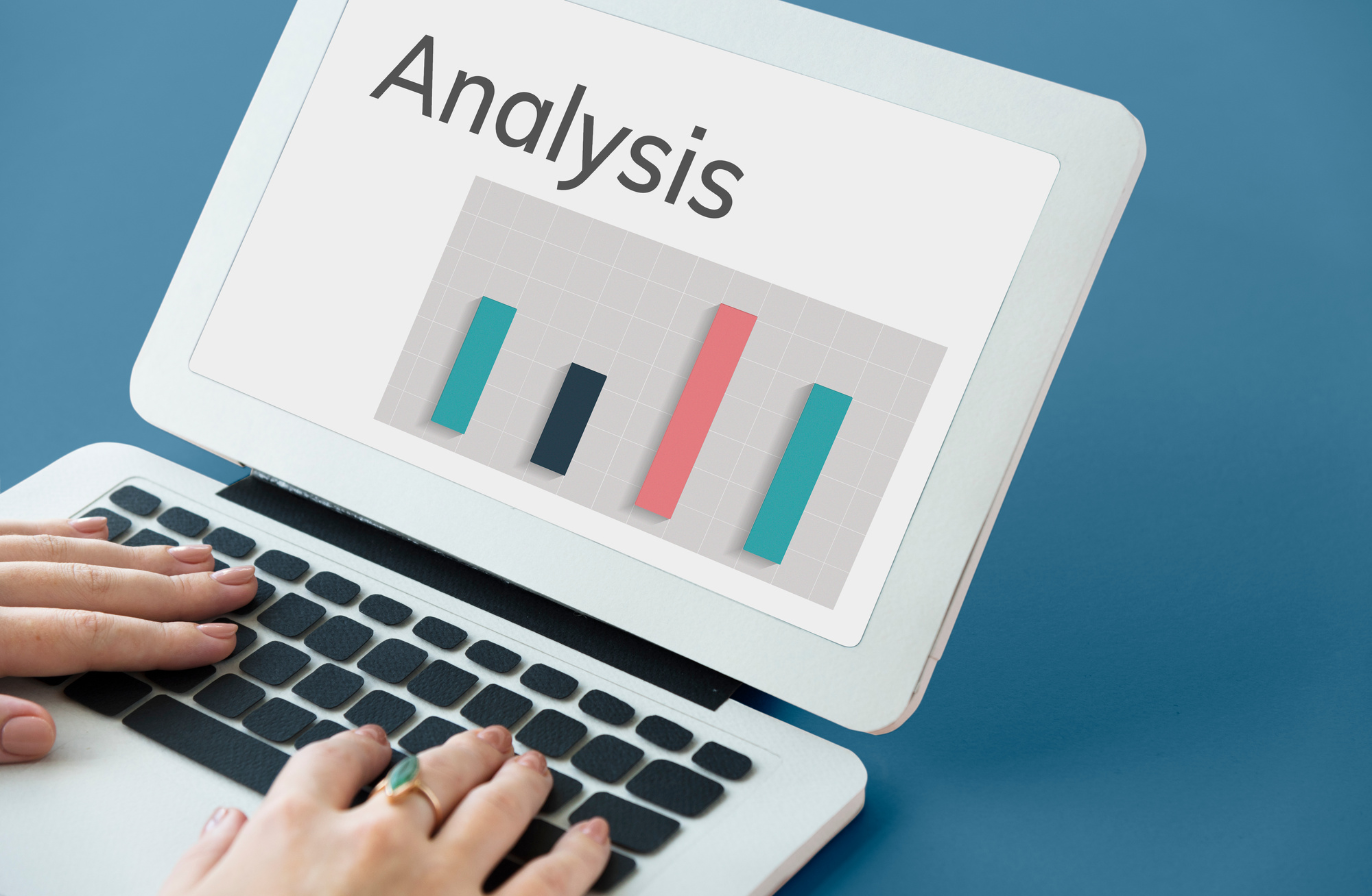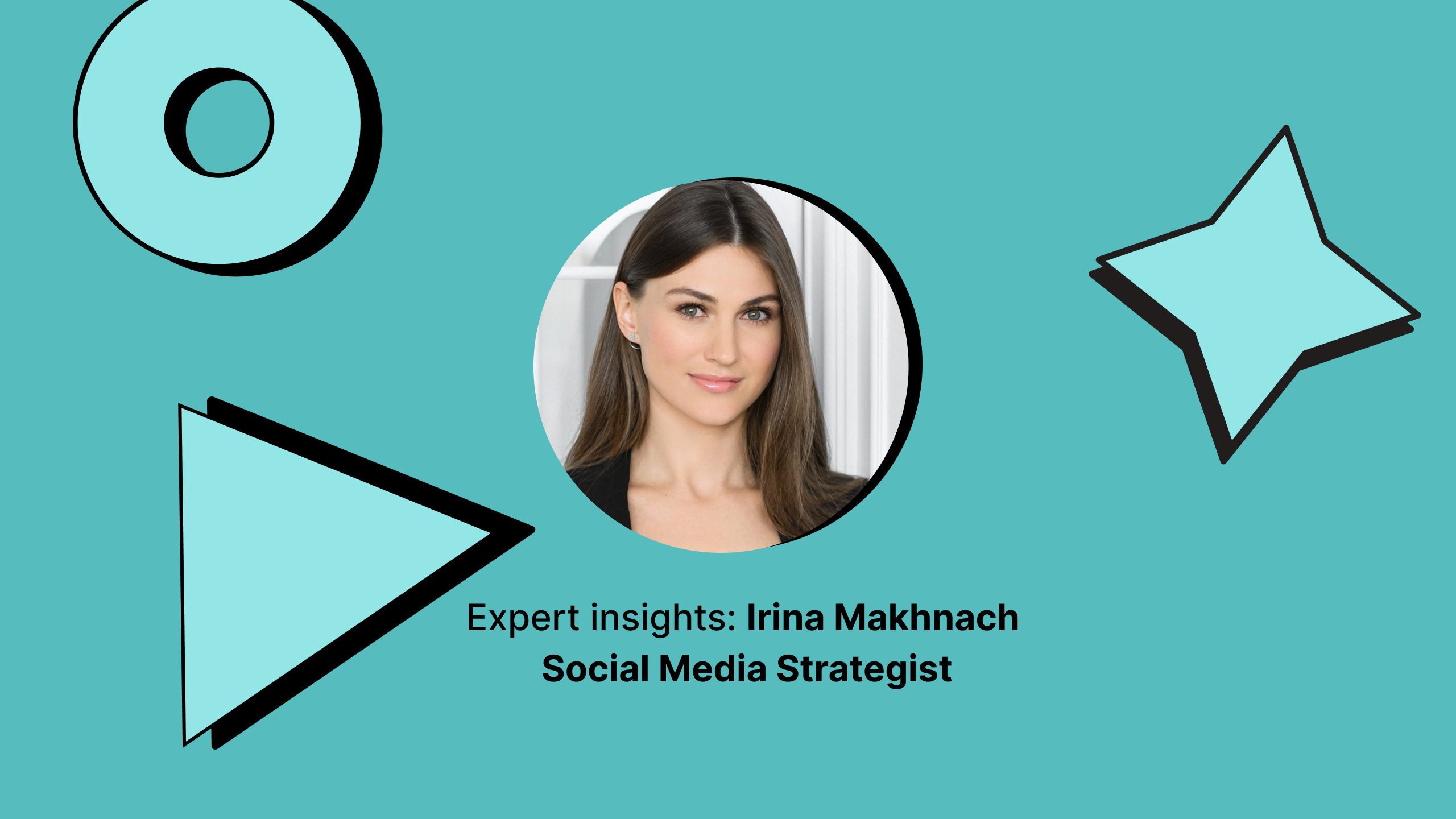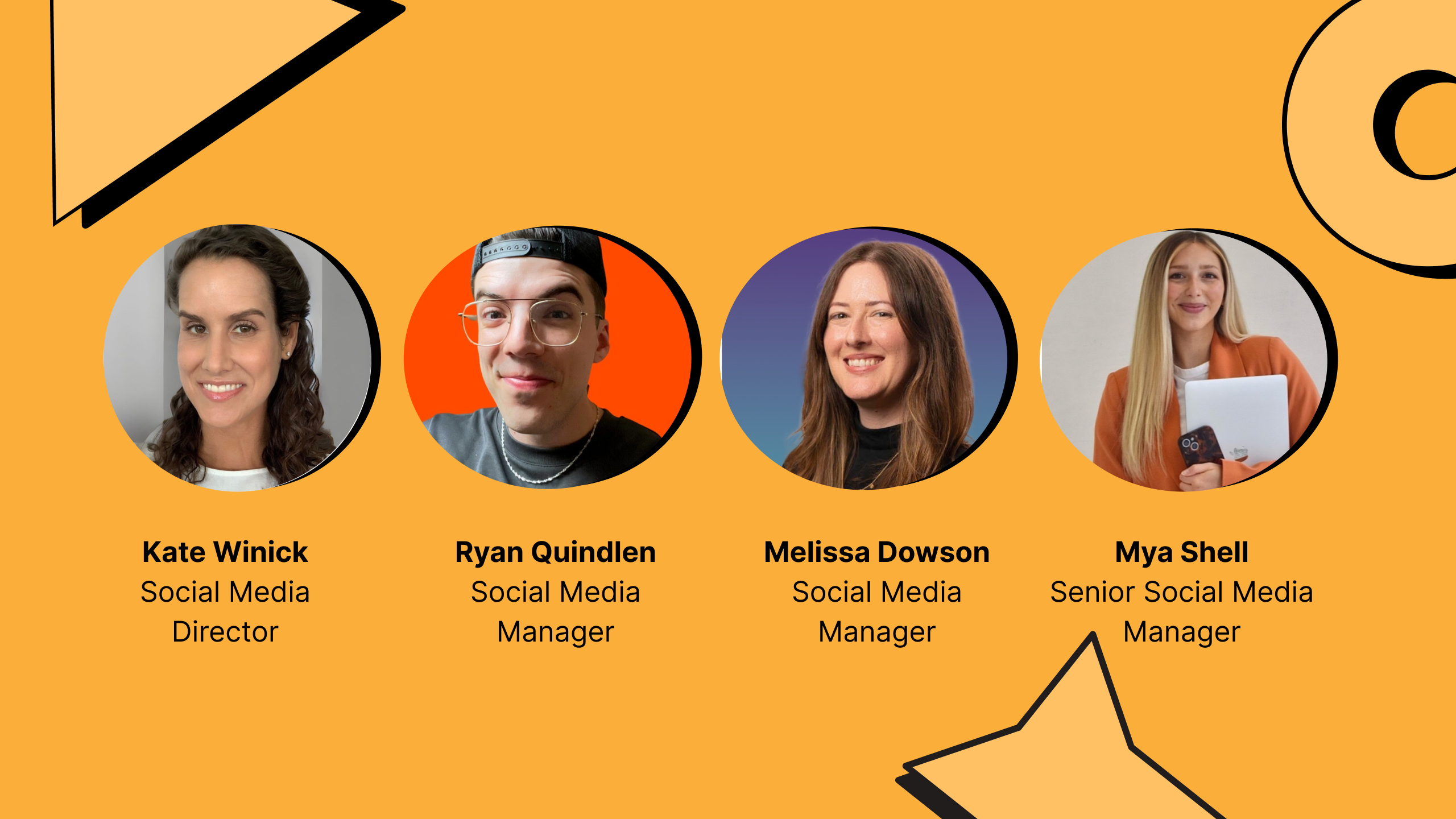AI in B2B Marketing: Use Cases, Tools & Best Practices
Dive into the world of AI in B2B marketing. Find out how to harness its power for smarter decision-making and increased business success.

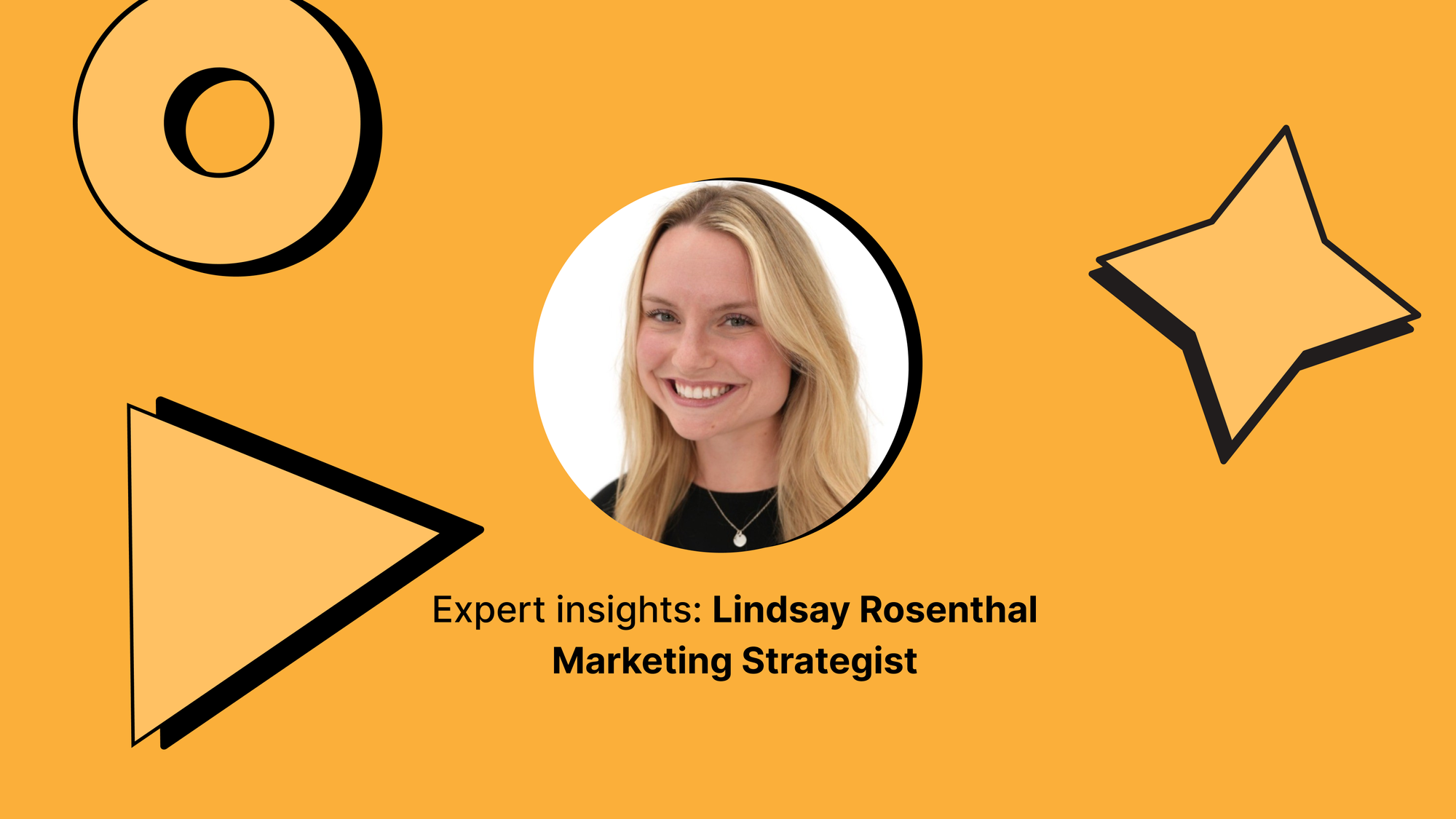
AI in B2B marketing is no longer just experimental. Businesses are making it an essential part of daily operations.
While AI in social media gets plenty of attention, the impact spans competitive intelligence, content strategy, lead qualification, resource optimization, and more.
Want to keep up? Let me show you how B2B companies are using AI to work smarter and move faster.
Key takeaways
-
Why AI in B2B marketing has become incredibly important: it comes down to its ability to solve resource constraints, enable predictive decision-making, and keep teams agile in unpredictable markets.
-
How can B2B businesses successfully leverage AI? By using it to power competitive intelligence, enhance content strategy, improve lead scoring, optimize ads, and strengthen revenue operations.
-
What are some best practices for AI in B2B marketing? These include starting with high-ROI, low-complexity use cases, building feedback loops that improve AI’s outputs, and keeping humans in charge of creativity and strategic nuance.
Why AI in B2B marketing has become incredibly important?
The gap between what B2B marketing teams are expected to deliver and the resources they have to do it keeps widening. AI is trendy, yes, but also essential to solving three fundamental challenges you're likely facing right now.
Challenge #1. Resource constraints vs. growth expectations
Here's what I see working with B2B teams: they have the same budget (or smaller) than last year, but increased goals (by 20-30%). They're expected to produce more content, analyze more data, and prove ROI faster than ever before.
The good news: AI amplifies what you can accomplish with the resources you have.
For exemple, when you're analyzing competitor performance or understanding social media metrics, AI can process information in minutes, not days. That time goes back to strategy and creativity, where you actually add value.
Challenge #2. The need for predictive capabilities
The traditional approach to B2B marketing has been reactive: launch a campaign, wait for results, then adjust.
AI marketing analytics change this equation. Instead of looking backward at what happened, you can identify patterns of what's likely to happen next. When you're tracking engagement trends and competitive insights, AI spots early indicators that your messaging is resonating (or not) before you've invested heavily in a full campaign.
Challenge #3. Staying agile in uncertain markets
Economic uncertainty and changing business (and buyer) needs mean that the B2B marketing strategy that worked last quarter might miss the mark today.
I actually had a chat with Lindsay Rosenthal recently. She's a B2B marketing expert and Founder of Cred. Marketing. And here's what she told me about the way she sees AI as a useful solution to this challenge:
In B2B, AI is most useful for clarity. Summarizing sales calls, spotting themes in feedback, and translating those insights into clear messaging. Strong messaging shortens the trust gap. Use AI to stay closer to what their buyer is actually saying.
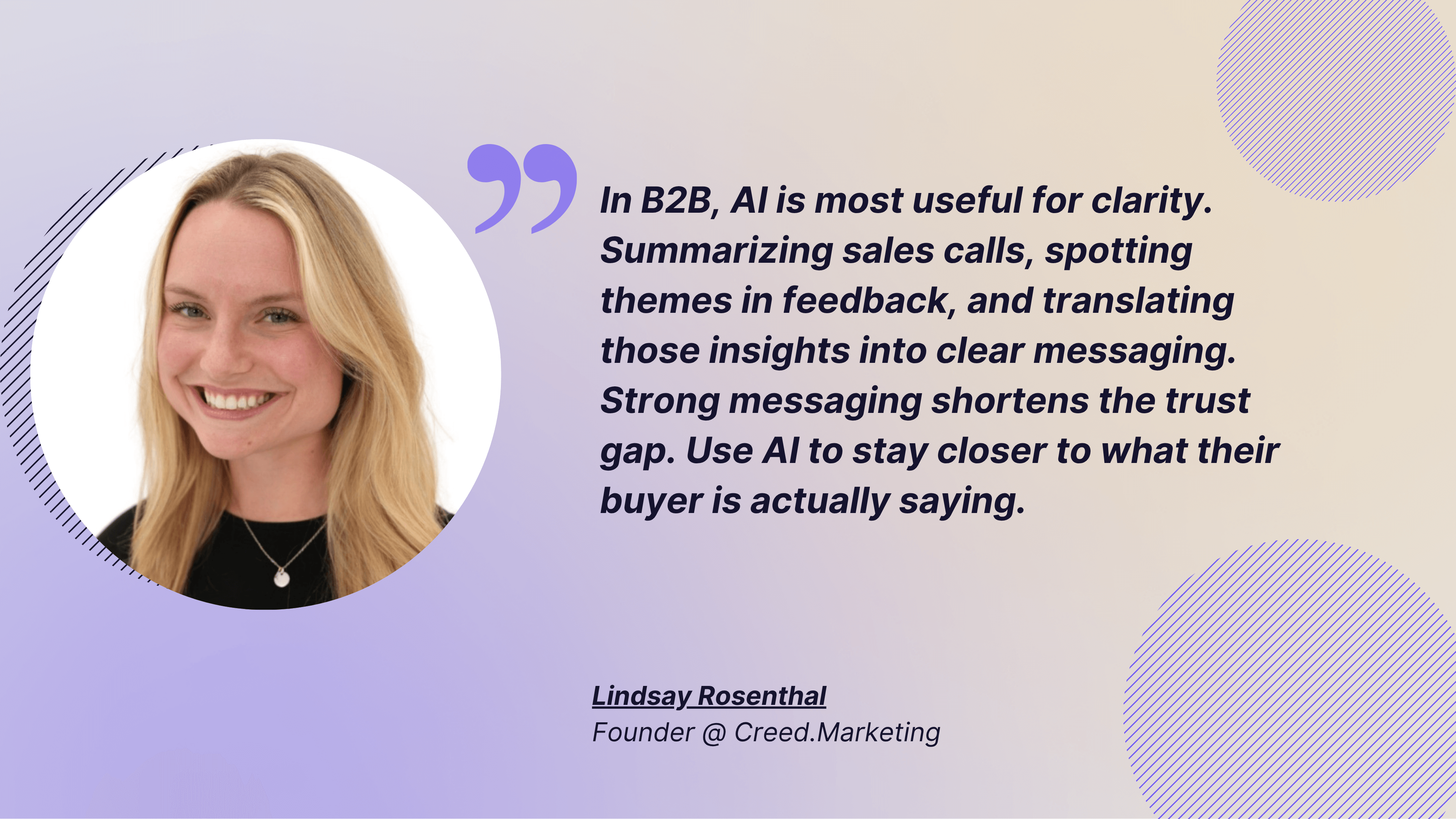
But she also warns: "It is important here to look past the 'shininess' of tools and evaluate what is actually effective for your goals."
How can B2B businesses successfully leverage AI?
While AI can improve nearly every part of your marketing operation, in some areas it creates a genuine strategic advantage, such as in data analysis and competitive intelligence.
Lindsay Rosenthal offers an important perspective here:
We are moving from AI as a tool we prompt to AI that can suggest next steps. In B2B, this means AI will help teams decide what to say, where to say it, and who to say it to based on observed patterns in buyer behavior. Agentic informed actions and autonomous work with human checks and balances.
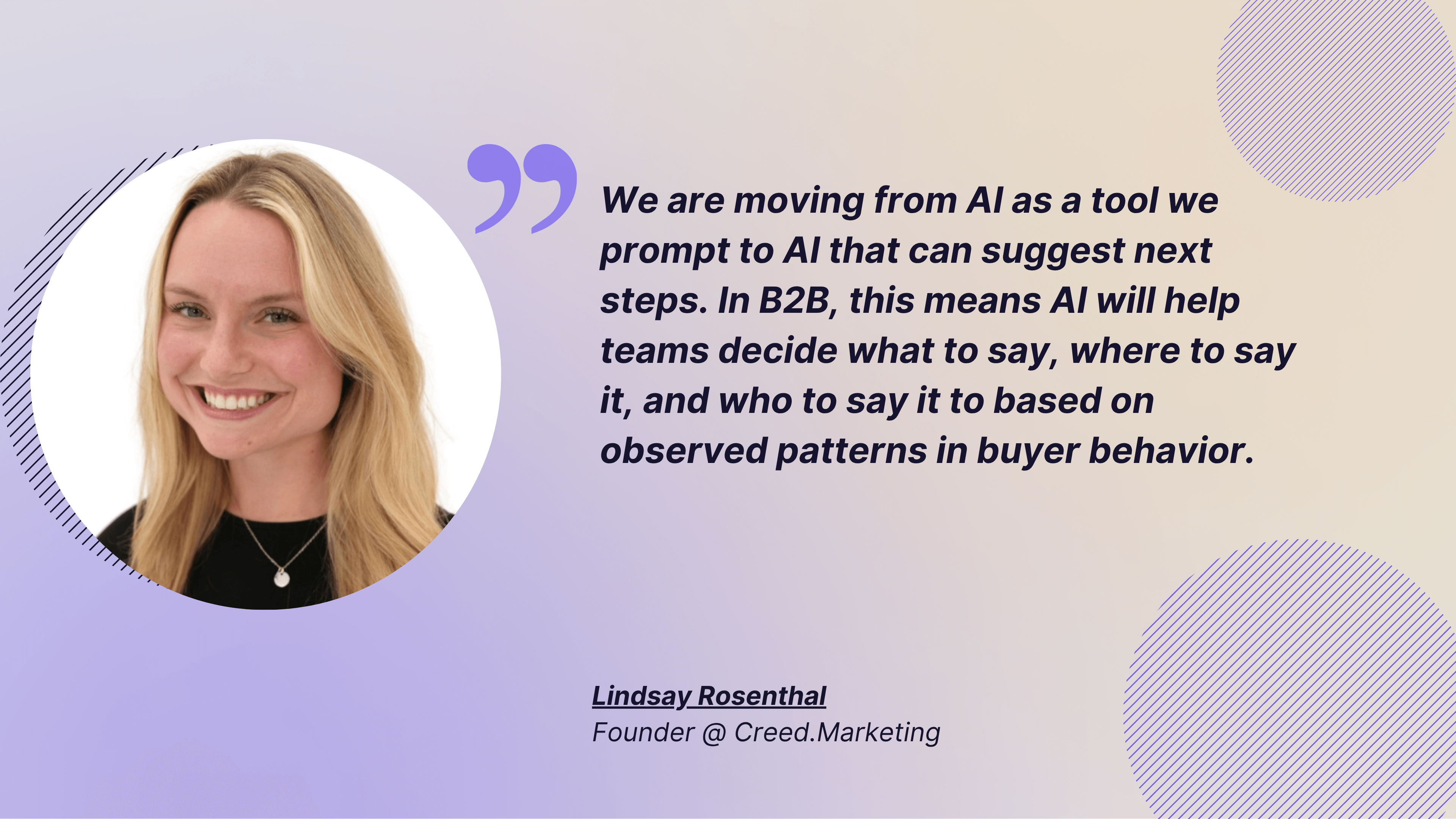
The change from reactive prompting to proactive suggestions is already happening in social media marketing, where AI tools for B2B marketing are becoming strategic partners rather than just execution assistants.
Social media use cases for AI
Social media has become a critical channel for B2B marketing, but it's also one of the most time-intensive to manage well. AI to the rescue! But not only by automating posts. The real value lies in revealing insights you'd otherwise miss, and doing it in real time.
Social media competitive intelligence and benchmarking
When you're trying to understand how your social performance stacks up against competitors, manual analysis becomes overwhelming fast.
AI-powered competitive analysis tools change this completely. Instead of spending hours pulling data and building spreadsheets, you get immediate visibility into who's winning and why.
Let me show you how this works in practice: I've done a trial comparing CRM brands on Instagram, with AI instantly analyzing follower growth patterns, engagement metrics across different profiles, and posting behaviors.
Socialinsider provides exactly this kind of AI-based performance summary within its dashboard. Rather than just showing you the numbers, it interprets them, providing practical advice for each brand, such as experimenting with hashtag usage to improve engagement or focusing on content quality despite strong follower growth.
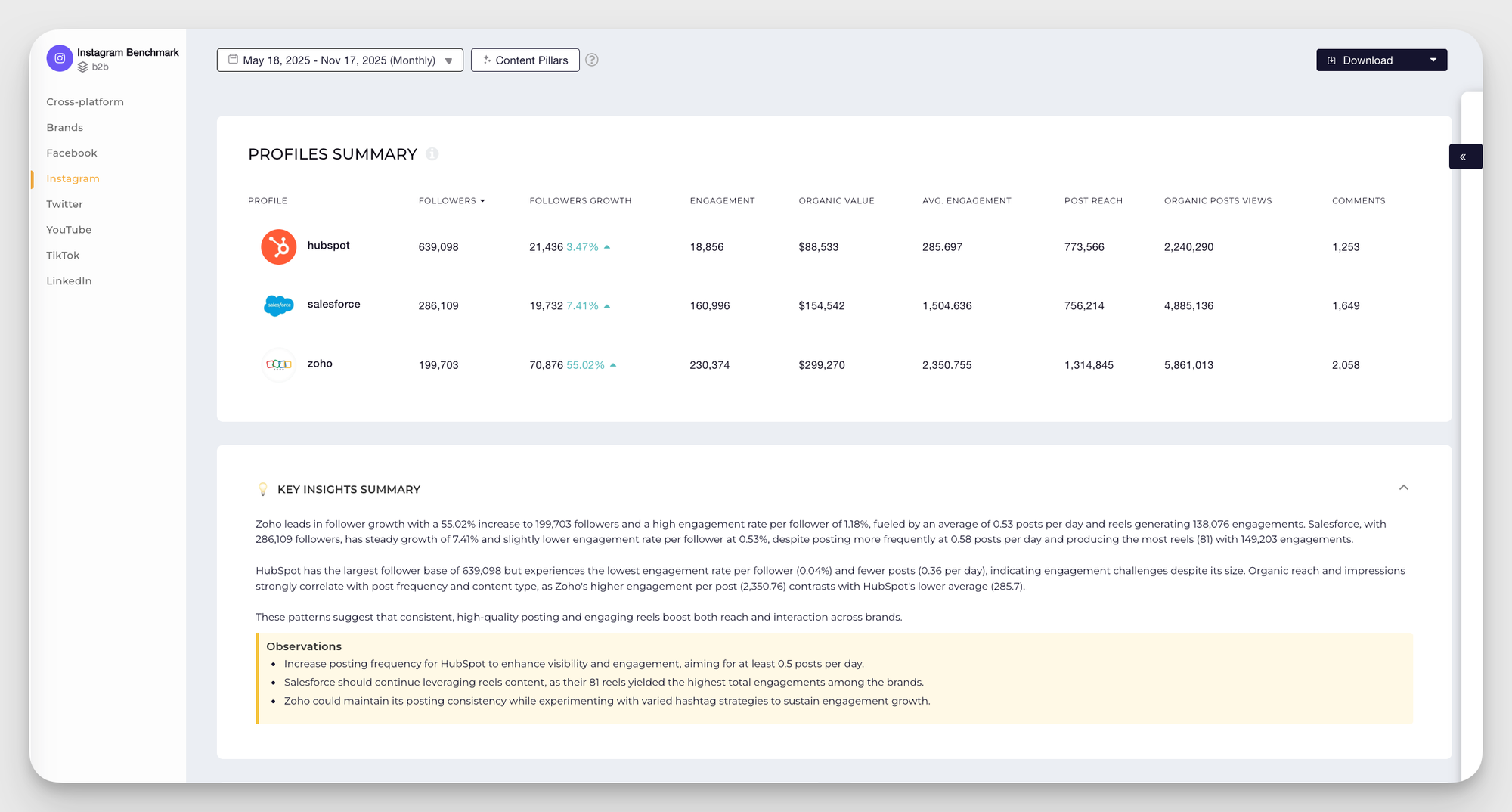
This is competitive benchmarking at a level that wasn't possible without AI because you're way beyond collecting and looking at data. You're getting strategic direction based on trend analysis across your entire competitive set.
And I know I may be biased, but here's what a user also mentions about Socialinsider:"unparalleled accuracy and depth of competitive data” in a recent G2 review. “It provides a level of insight into competitor strategies that I haven't found in other tools, allowing me to make truly informed decisions,” the Client Service Director adds.
Content strategy & planning
Your content strategy needs to do two things well: address what your audience cares about, and fill gaps your competitors are missing. AI marketing applications make both of these possible at scale.
Content pillars clustering
When you're planning your social media content strategy, you need to know which topics drive engagement. Good luck looking at hundreds of posts across different themes and platforms and correctly identifying patterns before your next campaign!
No need for luck, actually. Socialinsider's AI-based content pillars feature handles this analysis across your entire content library, grouping posts by theme and showing performance metrics for each pillar. You're seeing not just what you're posting about, but what's resonating with your audience.
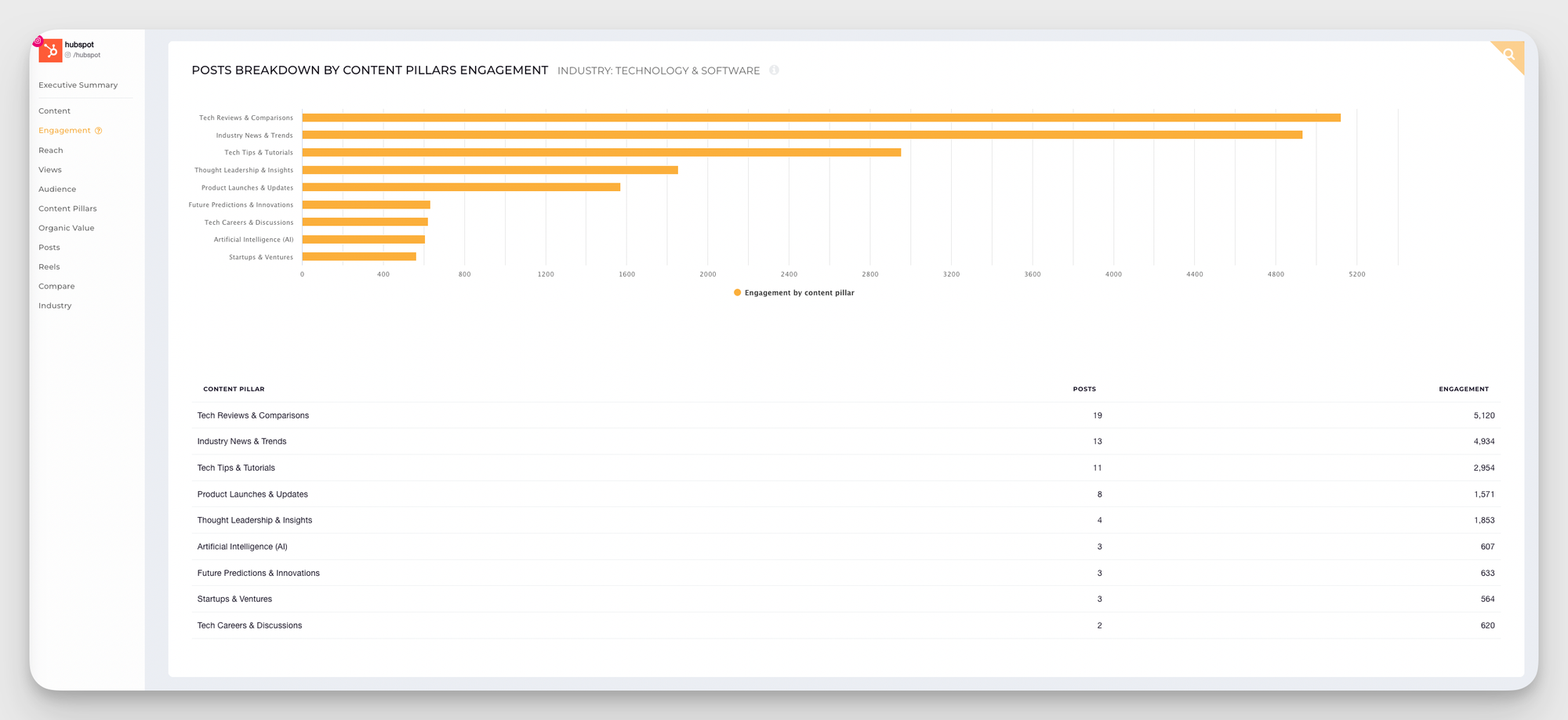
AI content gap identification
AI marketing analytics become really powerful when it comes to identifying what your competitors are doing that you're not, and more importantly, whether those gaps matter.
When you analyze industry content pillars across your competitive set, AI can show you themes that are working well for others but missing from your strategy entirely. Maybe your competitors are seeing strong engagement with tutorial content while you've focused exclusively on product launches. Or perhaps there's a content category you're all ignoring that represents an opportunity.
And have I mentioned that through Socialinsider's AI-based industry content pillars analysis, you can benchmark your content strategy against competitors and spot these gaps immediately?

The tool shows you the top-performing content themes across your industry, how many posts and what level of engagement each pillar generates, helping you make informed decisions about where to expand your content strategy.
Lead scoring & qualification
If you were to ask me, I'd say one of the most valuable ways to use AI in marketing is determining which leads actually deserve your sales team's attention.
AI can analyze behavioral signals, such as content downloads, email engagement, website visits, or social interactions, and predict conversion likelihood.
The result is automated lead prioritization. Instead of following up with everyone who downloaded a whitepaper, your team can focus on prospects whose behavior patterns match your best customers and who show genuine buying intent.
That's how to leverage AI in marketing to improve both efficiency and results.
Ad targeting and optimization
AI-targeted advertising refines audience segments based on actual behavior and engagement patterns, then continuously optimizes where your budget goes based on performance.
This means your ad spend shifts automatically toward the segments and placements driving results, while AI predicts which creative variations will perform best in real-time (not monthly or quarterly).
Business use cases
While social media gets a lot of attention when people talk about AI in B2B marketing, some of the most impactful applications happen in resource allocation, pipeline management, and revenue operations.
According to a 2025 McKinsey report, high-performing businesses use AI to drive growth, innovation, and cost.
Let me show you some of these powerful use cases.
Resource allocation optimization
When you're deciding where to invest your limited marketing resources, you need more than gut instinct. AI helps you identify where effort creates the most impact, then speeds up execution in those high-value areas.
Take content marketing as an example. At Socialinsider, SEO is our main acquisition channel, which means we need to produce high-quality studies and articles consistently. But creating in-depth, data-driven content is time-intensive, typically taking weeks from research to publication.
Enter the internal AI content writer that's changed how the Socialinsider team approaches this challenge. This AI tool is connected to our database, client interviews, webinars, and proprietary research, so it can provide accurate insights and relevant data that actually reflect our expertise.
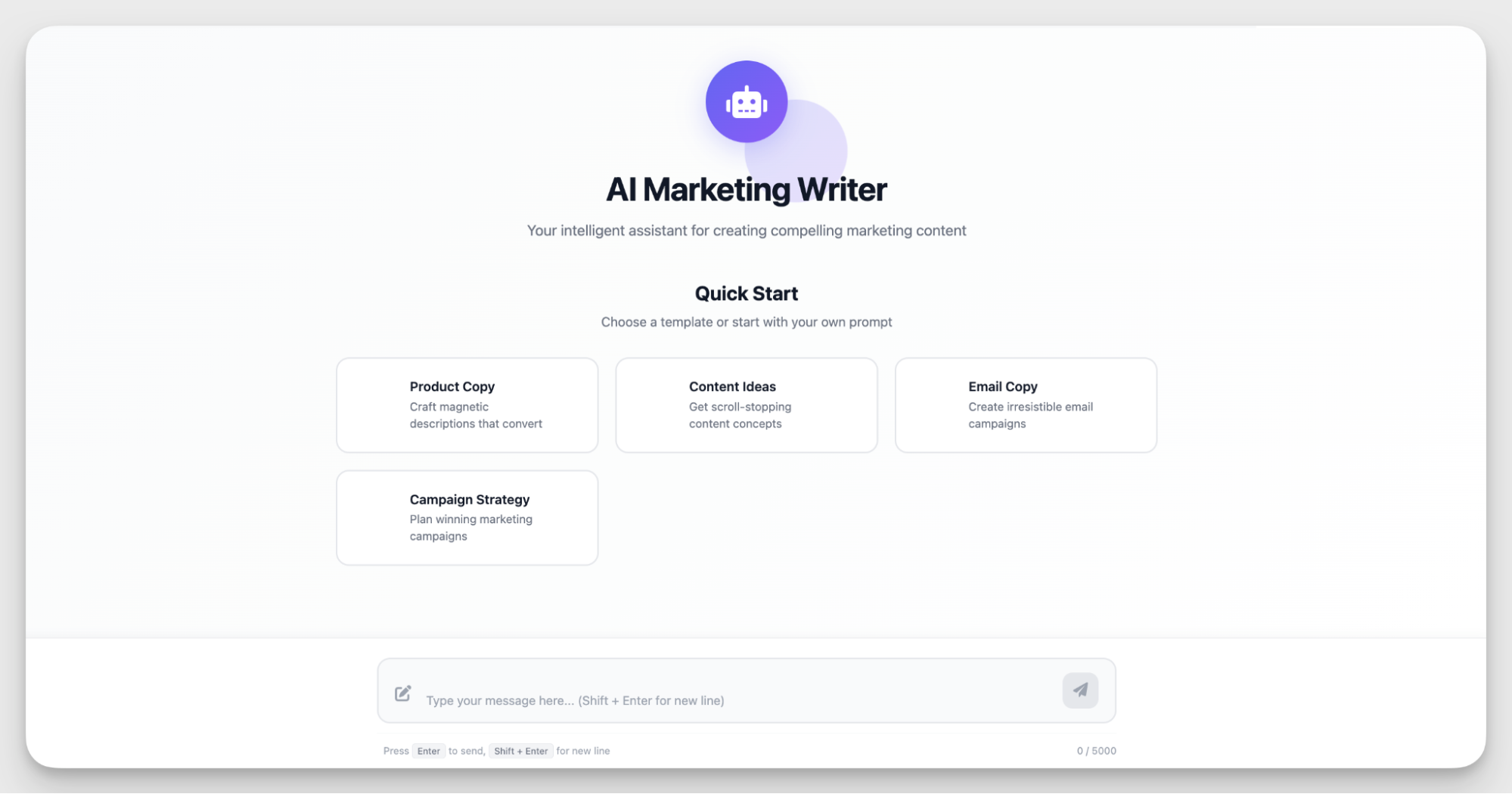
The interface offers templates for different content types, such as product copy, content ideas, email campaigns, and campaign strategy, giving our team quick starting points based on proven frameworks.
Here's how the process works: when we need to update an article, we can feed the AI our existing content, the new data we've gathered, and the structure we want to follow. The AI generates a detailed outline that incorporates both our proprietary insights and the technical depth we need.
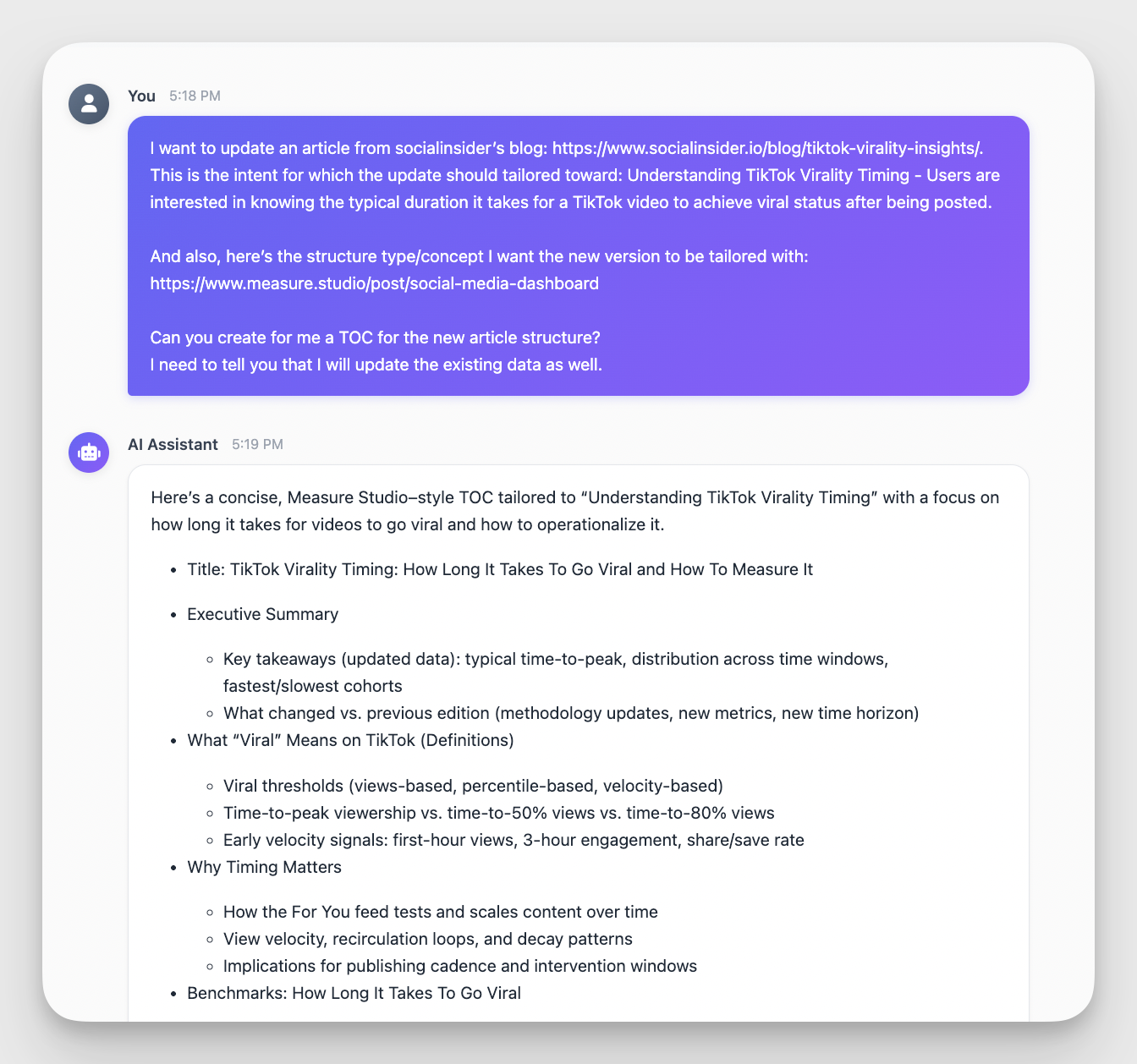
But — and this is important — we don't just publish what the AI produces. Our team reviews and refines the output, ensuring it aligns with our voice. When we ask for a more natural tone, the AI adjusts, but the Socialinisder team still shapes the final result.
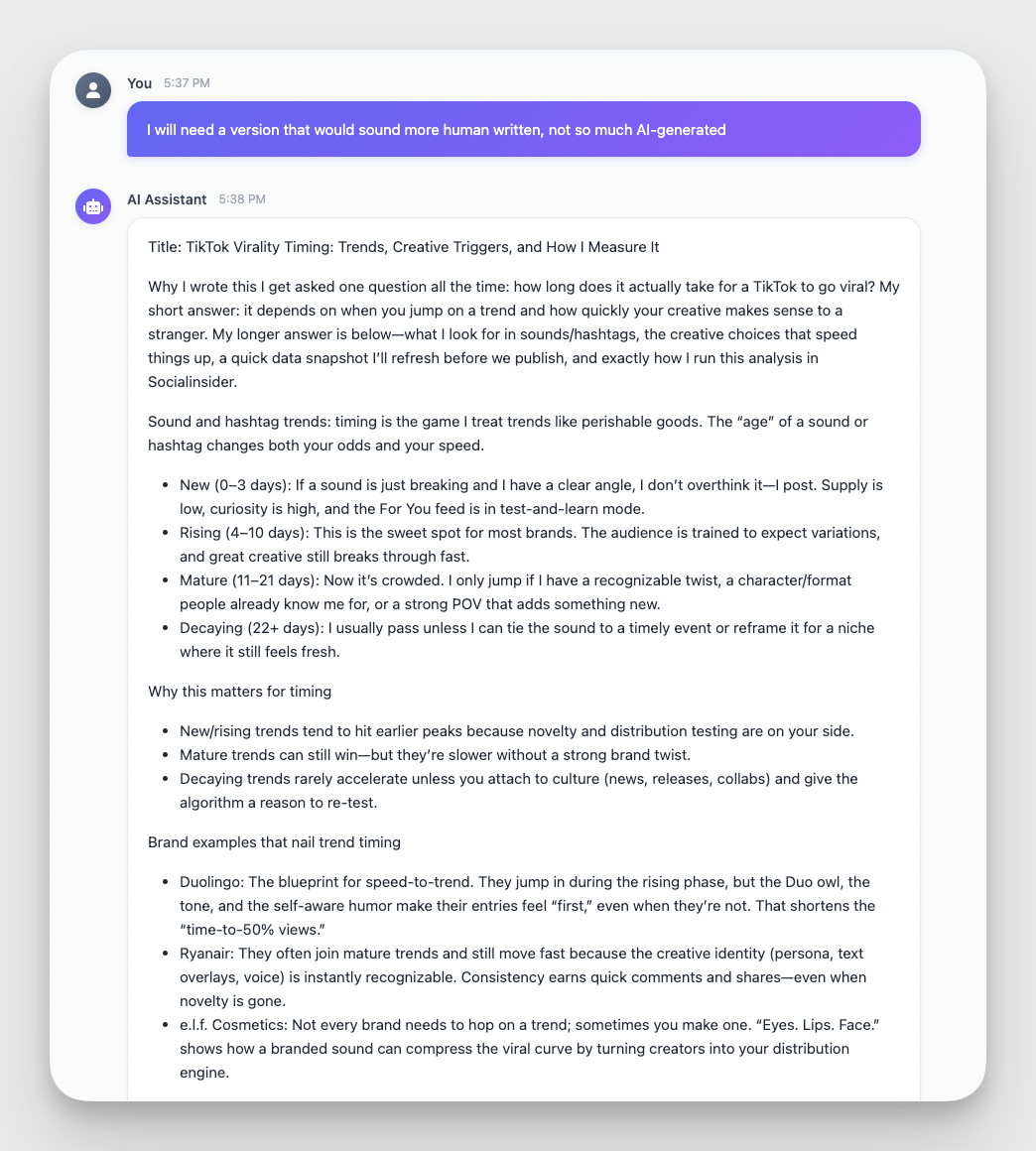
As a result, we've reduced the time to create a comprehensive study significantly, which means writers can be involved in more projects without sacrificing quality. You can see the results in articles like our TikTok virality research, which combines data analysis with strategic insights.
Pipeline prediction
When you're planning quarterly goals, you need to know what's realistic based on current pipeline health. AI analyzes historical conversion patterns, deal velocity, and engagement signals to predict which opportunities will close and when.
This predictive capability means you're seeing early warning signs when the pipeline isn't building fast enough, or identifying which marketing programs are actually contributing to closed revenue rather than just generating leads.
Churn risk identification
For B2B companies with subscription or recurring revenue models, identifying at-risk accounts before they churn is critical. In fact, one Reddit user calls AI the “churn risk bodyguard" when discussing underrated use cases of AI agents in B2B.
That’s because AI monitors product usage patterns, support ticket frequency, engagement with marketing content, and other behavioral signals to flag problematic accounts.
This early warning system gives your sales and marketing teams time to intervene with targeted content, personalized outreach, or an adjusted customer journey for similar accounts.
Revenue forecasting
AI-powered revenue forecasting accounts for seasonality, market conditions, campaign performance, and pipeline health to give you more accurate revenue predictions.
When making decisions about hiring, budget allocation, or campaign investment, having reliable forecasting data means you can make strategic choices based on likely outcomes rather than best-case scenarios.
Best practices for AI in B2B marketing
Getting AI right in your B2B marketing is about testing tools, implementing strategically, and learning as you go. Here are my top best practices for that:
Start with high-ROI, low-complexity use cases
My advice? Don't start your AI journey by trying to automate your entire brand strategy framework. Begin with straightforward applications where AI delivers clear value without requiring massive integration work.
I personally think that social media analysis, competitive benchmarking, and content performance tracking are perfect starting points. These use cases deliver immediate insights without requiring you to rebuild your entire marketing operation. Once you've proven value here, you can expand to more complex applications.
Create mechanisms for AI to learn from outcomes
AI is changing faster than I can write this article. So, you can’t set it and forget it.
The most effective artificial intelligence marketing tools improve over time as they learn from real results. Build feedback loops that inform future AI recommendations based on outcomes.
Set up regular reviews of AI-generated insights. When you're using AI prompts for social media or content creation, track which outputs perform best and feed that data back into your process. If certain types of social media content outperform AI predictions, investigate why.
This process helps you understand where AI adds value and where you still need oversight and adjustment.
Let AI handle scale, let humans handle nuance
The example I shared earlier about Socialinsider's AI content writer illustrates this perfectly.
AI handles the heavy lifting, synthesizing research, structuring content, and pulling relevant data from our knowledge base. But writers add the strategic thinking, refine the tone, and ensure the insights actually make sense for the target audience.
Lindsay Rosenthal emphasizes this point and makes a prediction:
Use real customer input as the base. Keep a human editor for tone, judgment, and unique human creativity. Make sure everything you publish aligns with real buyer language and pain points, not just what sounds good in theory. And always always have the human add their own flaw and creative direction. In 2026, the campaign that resonate feel the LEAST like AI!

Final thoughts
AI isn’t replacing your B2B strategic thinking (not for a while, at least), but it amplifies what you can accomplish with limited resources.
The teams winning with AI now aren't the ones using the most tools, but those using the right ones strategically, for both social media and business use cases.
If you want to see for yourself how AI-powered data analysis works, try Socialinsider for free — you get 14 days to analyze your social performance and benchmark against competitors like a pro.
FAQs on AI in B2B marketing
What are the key applications of AI in B2B marketing?
- Competitive intelligence & benchmarking: Instantly analyzing competitors’ performance, messaging, and social strategies.
- Content strategy & planning: Identifying top-performing content pillars, clustering themes, and spotting content gaps at scale.
- Lead scoring & qualification: Predicting which leads are most likely to convert based on behavioral signals.
- Ad targeting & optimization: Automatically refining audience segments and reallocating spend based on real-time performance.
- Resource allocation: Helping teams decide where marketing efforts will have the highest impact.
- Pipeline prediction: Forecasting which opportunities are likely to close and when.
- Churn risk identification: Detecting at-risk accounts early through usage patterns and engagement signals.
- Revenue forecasting: Providing more accurate predictions using historical, seasonal, and performance data.
Analyze your competitors in seconds
Track & analyze your competitors and get top social media metrics and more!
You might also like
Improve your social media strategy with Socialinsider!
Use in-depth data to measure your social accounts’ performance, analyze competitors, and gain insights to improve your strategy.

